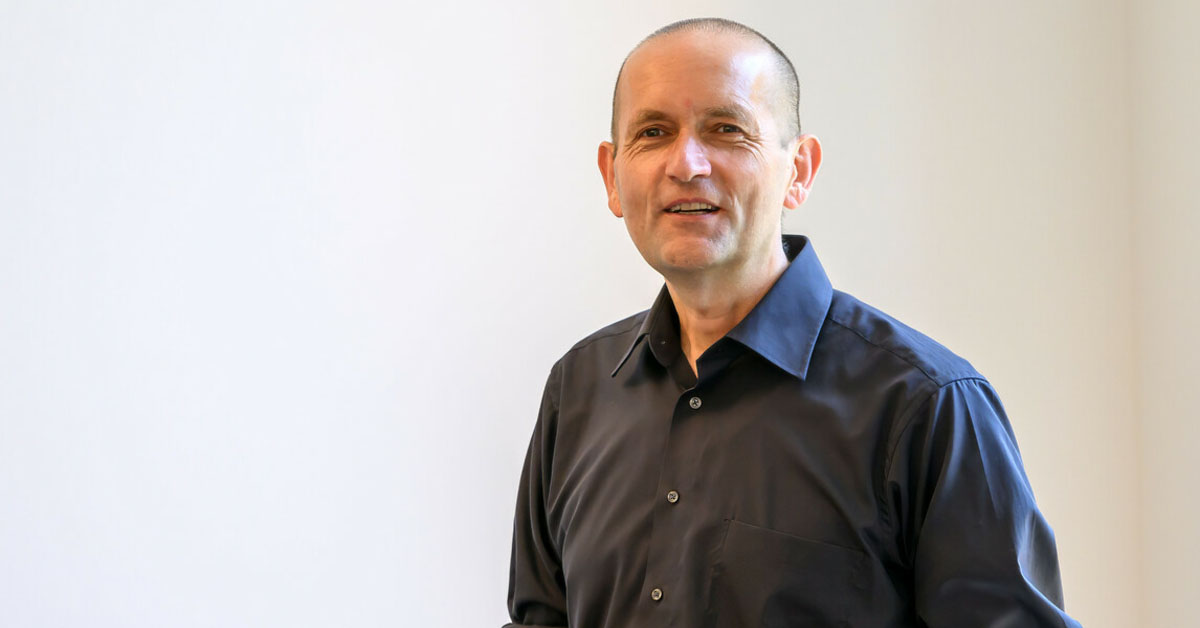Putting the humanities into conversation with artificial intelligence

Wheaton Magazine caught up recently with Joerg Blumtritt, professor of the practice of digital media and communications, to talk about the artificial intelligence boom and how the humanities can help us better understand and ethically use this rapidly-evolving technology. Blumtritt has spent his career in media research, exploring big data and AI’s increasing impact on social research. As the director of the Wheaton Institute for the Interdisciplinary Humanities (WIIH), he plans to re-balance the conversation, organizing campus-wide discussion on the perspectives of the humanities as a necessary counterweight to the technological promise and perils of artificial intelligence.
What is pulling AI away from the humanities?
There are two forces. First, technology. We have become used to talking about technological innovation always as ‘the next big thing’. A lot of tech is thrown into the world to solve problems that might, in reality, not be that important. The language of ‘disruption’ is telling. It is less about adding something new than about destroying things that a lot of people actually love, like writing or doing creative work with images.
The second force is the economy of AI. Systems are pushed into the market at an incredible speed. There is no time to efficiently scale, to carefully think about products, or to meaningfully engage in policy debate … This is not an environment where openness or transparency thrive, let alone creativity. The economic forces prevent anything eccentric from emerging. AI is on the way to become like mobile phones—closed, shiny boxes.
Why is it important for the humanities to engage with AI and in what ways?
AI creates ethical problems with a wide range of issues … data bias and discrimination, violations of informational self-determination and privacy, undermining of authorship, precarious labor, fake news, libel and defamation, creation of harmful images, and a general lack of accountability and reliability inherent in all machine learning technologies.
The humanities add to the critical discourse. They might suggest alternatives to the destructive economies of scale at work, and they could propose different, creative and philosophical ways of understanding and using AI.
How will the WIIH address AI issues on campus?
In addition to hosting open discussions about AI with invited guests, we want to contribute to the development of an interdisciplinary AI curriculum, building on existing classes and adding new courses on “Understanding AI”. I hope that our work will evolve into a continuous conversation about AI at Wheaton.
Are there any AI tools that you are particularly excited about integrating into the humanities?
I love working with large text corpora like Google Books or Wikipedia, understanding how to explore and drive meaning from unstructured data. I also enjoy chatbots. You can ask ChatGPT to write a poem in dactylic hexameters in the style of Lucretius, and there it goes. Even better, however, is how the bots fail. They are often not able to give correct answers to the simplest questions. Instead they come up with the weirdest hallucinations. Also, the precious and pretentious language they have. There is a lot on which to work in the humanities.
How are you using AI and how do you want students to use it in coursework?
In my non-academic work, I support media and publishing companies using AI. Personally, translation is the most useful application of AI for me so far.
Generally, the main point for AI in the classroom will be about writing. First, AI can help with inclusion. For students with dyslexia, for example, AI can be of great support. However, since writing assignments only make sense if the students actually do the work, and I am not naive enough to think that students are not using bots, I have reconsidered the homework for my classes.
How does this theme fit into the “Information and Communication Technologies” course you are teaching this fall and with digital media and communication overall?
The course introduces communication by looking at the history of technologies from the perspective of science and technology studies. AI will play a role in two ways. First, we will look at how it is a tool for digital humanities, deciphering the charred fragments from the Villa dei Papiri. Second, we will critique the economy of AI in the course of the general discussion of the tech economy, and in particular deconstruct the narrative of progress.
Overall, AI will be an important tool to understand and for which to develop skills. It will be an object of critical study. And it will be a field for experimentation and creativity.
